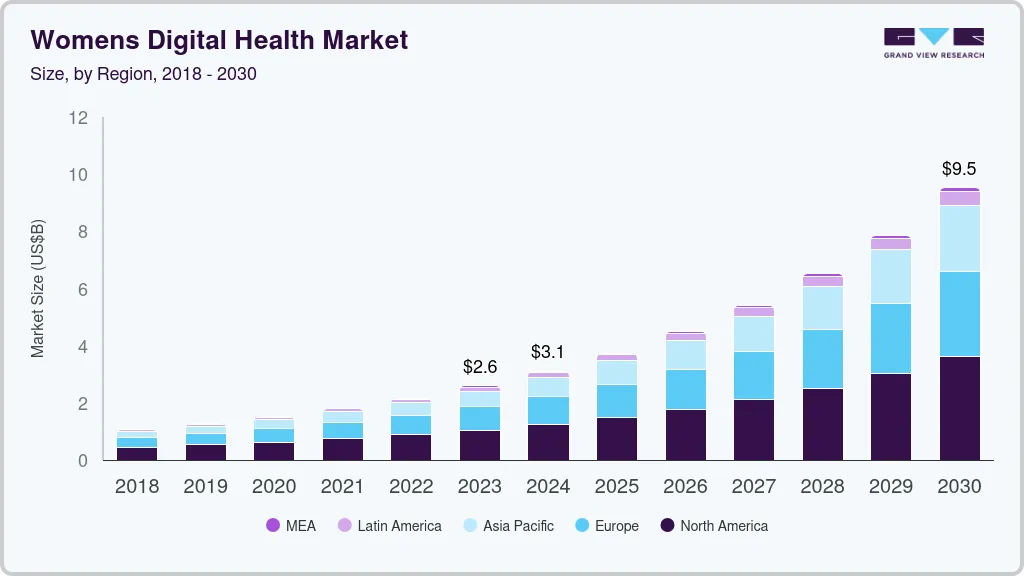Women’s Digital Health Market 2030: Opportunities in General Healthcare
The global women’s digital health market was valued at USD 2.59 billion in 2023 and is forecasted to grow significantly to USD 9.53 billion by 2030, registering a compound annual growth rate (CAGR) of 20.4% between 2024 and 2030
Global Women’s Digital Health Market Overview
The global women’s digital health market was valued at USD 2.59 billion in 2023 and is forecasted to grow significantly to USD 9.53 billion by 2030, registering a compound annual growth rate (CAGR) of 20.4% between 2024 and 2030. The widespread adoption of mobile devices has greatly facilitated women’s access to digital health tools, enabling them to conveniently monitor and manage their health.
Mobile applications designed for menstrual tracking, fertility monitoring, and overall wellness have become essential parts of many women’s everyday routines. These tools empower users by providing real-time health data and insights, encouraging a proactive and personalized approach to healthcare. The rapid advancement of digital technologies, including mobile health apps, wearable devices, and telemedicine platforms, has fostered a dynamic ecosystem supporting women’s health management.
Such technologies provide personalized, accessible, and real-time monitoring, which is critical for managing hormonal imbalances, reproductive health concerns, and chronic illnesses. As these solutions grow increasingly sophisticated and user-friendly, they enable women to manage their health with enhanced autonomy and precision. Supporting this trend, a survey by Rock Health revealed that 80% of consumers are willing to use at least one digital health tool, and 82% of women surveyed utilize telemedicine, reflecting growing confidence in digital healthcare solutions.
Order a free sample PDF of the Women’s Digital Health Market Intelligence Study, published by Grand View Research.

Key Market Trends & Insights
- Regional Dominance: North America led the women’s digital health market in 2023, accounting for 41.6% of global revenue. This dominance stems from the high penetration of digital health technologies and widespread smartphone usage, which facilitates rapid access to vital healthcare resources.
- U.S. Market Leadership: Within North America, the U.S. holds the largest share. Platforms like the Mayo Clinic’s Women’s Health app and resources from the American College of Obstetricians and Gynecologists (ACOG) play pivotal roles in educating women about reproductive health, pregnancy, and menopause.
- By Type: Mobile apps were the most popular digital health type in 2023, capturing 65.5% of the market share. Their convenience and accessibility allow women to manage health concerns directly from their smartphones, with functionalities tailored to menstrual tracking, pregnancy, mental health, and more.
- By Application: The reproductive health segment led the market in 2023. Conditions such as polycystic ovary syndrome (PCOS), endometriosis, and irregular menstrual cycles affect many women and often require continuous monitoring and management.
Market Size & Forecast
- 2023 Market Size: USD 2.59 Billion
- 2030 Projected Market Size: USD 9.53 Billion
- CAGR (2024–2030): 20.4%
- Leading Region (2023): North America
Leading Companies in Women’s Digital Health
The market features several key players that drive innovation and hold significant market shares:
- HeraMED offers the HeraCARE digital platform for remote patient monitoring, telehealth services, and educational resources aimed at healthcare professionals and pregnant women. Its HeraBEAT fetal heart rate monitor allows expectant mothers to hear their baby’s heartbeat from home.
- iSono Health provides comprehensive digital health solutions integrating real-time imaging and patient engagement tools seamlessly into existing healthcare workflows.
Other notable companies include:
- Clue by Biowink
- Chiaro Technology Ltd.
- Natural Cycles
- Ava Science, Inc.
- NURX Inc.
- Prima-Temp, Inc.
- Glow
- Lucina Health
- MobileODT Ltd.
- Braster SA
- Athena Feminine Technologies
- Plackal Tech
Explore Horizon Databook – The world's most expansive market intelligence platform developed by Grand View Research.
Conclusion
The global women’s digital health market is experiencing rapid growth, driven by increasing smartphone penetration, technological advancements, and a growing emphasis on personalized healthcare. With rising awareness and trust in digital health tools, women are increasingly empowered to manage their reproductive health, hormonal conditions, and overall wellness proactively. The expansion of mobile apps, telemedicine, and wearable technologies, especially in North America, highlights a trend towards accessible, user-friendly health management solutions tailored specifically to women’s needs. This strong growth trajectory is expected to continue through 2030, supported by innovative market leaders and evolving consumer preferences.